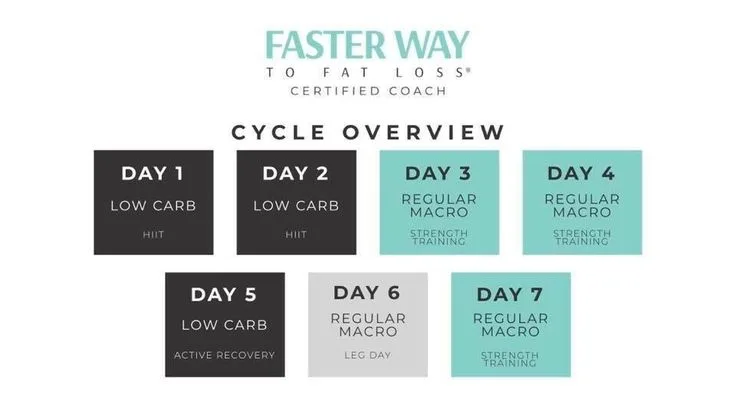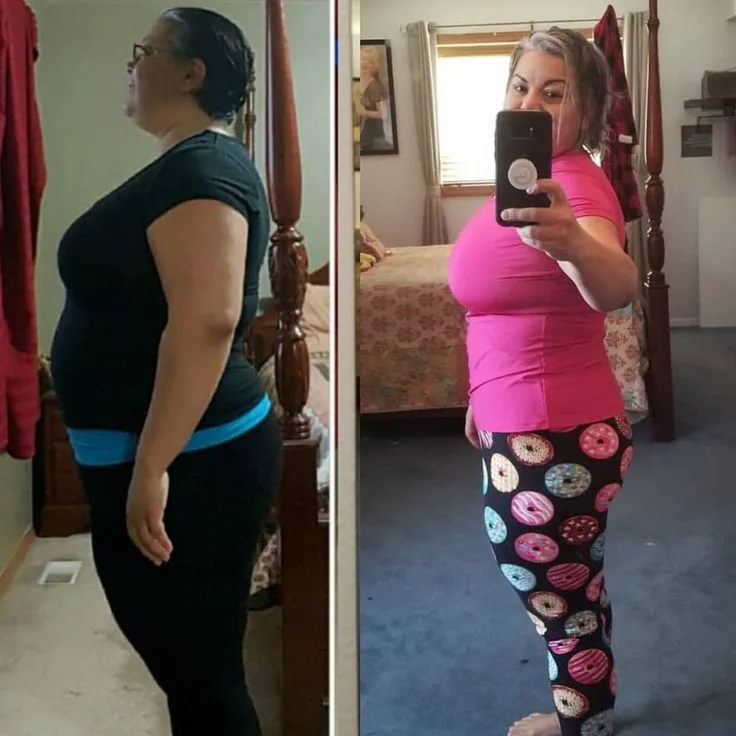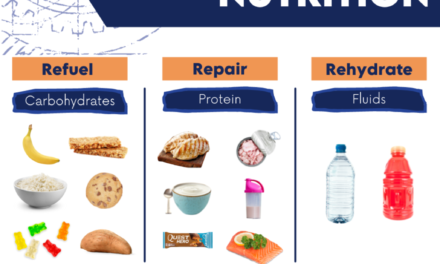Introduction
The faster way to fat loss involves creating a calorie deficit through a combination of diet and exercise strategies. This can include eating a balanced diet, incorporating intermittent fasting, engaging in high-intensity interval training (HIIT), and doing strength training exercises. By following these approaches, you can achieve weight loss goals more efficiently and improve your overall health and well-being.
Losing weight can be a challenging journey, but with the right approach, it can be achieved efficiently and sustainably. While there’s no magic pill for instant weight loss, there are several strategies that can help you shed those extra pounds faster.
Here’s a step by step guide to the faster way to fat loss:

1.Set Realistic Goals:
Start by setting achievable and realistic weight loss goals. Aim to lose 1-2 pounds per week, as this is considered a safe and sustainable rate of weight loss.
2. Create a Calorie Deficit:
To lose weight, you need to consume fewer calories than you burn. Calculate your daily caloric needs and aim to create a calorie deficit through a combination of diet and exercise.
3.Follow a Balanced Diet:
Focus on eating whole, nutrient-dense foods such as fruits, vegetables, lean proteins, and whole grains. Avoid or limit processed foods, sugary drinks, and high-fat foods.
4. Intermittent Fasting:
Consider incorporating intermittent fasting into your routine. This eating pattern involves cycling between periods of eating and fasting and has been shown to aid weight loss.
5.High-Intensity Interval Training (HIIT):
Incorporate HIIT workouts into your exercise routine. HIIT involves short bursts of intense exercise followed by periods of rest and has been shown to be effective for burning calories and fat.
6. Strength Training:
Don’t neglect strength training, as it helps build muscle mass, which in turn increases your metabolism. Aim to include strength training exercises at least 2-3 times per week.
7.Stay Hydrated:
Drinking plenty of water not only helps keep you hydrated but can also help you feel full, which can prevent overeating.
8.Get Adequate Sleep:
Aim for 7-9 hours of quality sleep per night. Poor sleep can disrupt your hunger hormones and lead to weight gain.
9.Manage Stress:
High levels of stress can lead to weight gain and make it harder to lose weight. Find healthy ways to manage stress, such as meditation, yoga, or spending time outdoors.
10. Track Your Progress:
Keep track of your food intake, exercise, and weight loss progress. This can help you stay motivated and make adjustments to your plan as needed.
Benifits:
Losing weight at a faster rate can offer several benefits, but it’s important to do so in a healthy and sustainable manner.

Here are some of the benefits of a faster way to fat loss:
1.Improved Metabolic Health:
- Losing weight can improve insulin sensitivity, reduce inflammation, and lower the risk of chronic diseases such as type 2 diabetes and heart disease.
2.Increased Energy Levels:
- Shedding excess weight can lead to increased energy levels, as the body becomes more efficient at using energy.
3.Boosted Confidence and Self-Esteem:
- Achieving your weight loss goals can boost your confidence and self-esteem, improving your overall mental well-being.
4.Better Sleep:
- Weight loss can improve sleep quality, as excess weight can contribute to sleep apnea and other sleep disorders.
5. Reduced Joint Pain:
- Losing weight can reduce the strain on your joints, leading to less pain and improved mobility, especially in weight-bearing joints like the knees and hips.
6: Improved hormonal balance:
- Excess weight can disrupt hormone levels, leading to issues such as insulin resistance and hormonal imbalances. Weight loss can help restore hormonal balance.
7.Enhanced Physical Fitness:
- Losing weight can improve your physical fitness levels, making it easier to engage in physical activities and exercise.
8. Lowered Risk of Cancer:
- Some studies suggest that losing weight may reduce the risk of certain types of cancer, including breast, colon, and prostate cancer.
9.Improved Digestive Health:
- Eating a healthy diet and losing weight can improve digestive health, reducing symptoms of conditions such as acid reflux, bloating, and constipation.
10.Longer Lifespan:
- Maintaining a healthy weight is associated with a longer lifespan and a reduced risk of premature death.
It’s important to note that while losing weight quickly can offer these benefits, it’s crucial to do so in a healthy and sustainable manner. Rapid weight loss diets or extreme exercise regimens can be harmful and may lead to nutritional deficiencies, muscle loss, and other health issues. Always consult with a healthcare provider before starting any weight loss program.
Definition of strategic Diet and Exercise
1.Strategic Diet:
-Calorie Deficit:Creating a calorie deficit is the cornerstone of fast-track fat loss. This involves consuming fewer calories than your body expends, leading to weight loss over time.
-Macronutrient Balance:Prioritize high-quality proteins, healthy fats, and complex carbohydrates to support satiety, muscle preservation, and energy levels.
-Meal Timing:Consider intermittent fasting or strategic meal timing to optimize fat burning and regulate hunger hormones.
-Nutrient Density:Focus on nutrient-dense foods such as fruits, vegetables, lean proteins, and whole grains to maximize health benefits and support overall well-being.
-Hydration:Stay hydrated by drinking plenty of water throughout the day, as dehydration can often be mistaken for hunger.
2.Strategic Exercise:
-Cardiovascular Exercise:Incorporate high-intensity interval training (HIIT), steady-state cardio, or circuit training to boost calorie burn, improve cardiovascular health, and accelerate fat loss.
-Strength Training:Integrate resistance training exercises to build lean muscle mass, which can increase metabolism and enhance fat burning both during and after workouts.
-Compound Movements:Prioritize compound exercises such as squats, deadlifts, lunges, and bench presses to engage multiple muscle groups simultaneously and maximize calorie expenditure.
-Progressive Overload:Continuously challenge your body by progressively increasing the intensity, duration, or resistance of your workouts to stimulate muscle growth and prevent plateaus.
-Recovery:Allow adequate rest and recovery between workouts to optimize muscle repair and minimize the risk of injury, ensuring consistent progress toward your fat loss goals.
Question and Answers:
Q: What is the faster way to fat loss?
A: The faster way to fat loss involves creating a calorie deficit through a combination of diet and exercise. This can be achieved by consuming fewer calories than you burn and incorporating strategies such as intermittent fasting, high-intensity interval training (HIIT), and strength training into your routine.
Q: How can I create a calorie deficit?
A: To create a calorie deficit, you can start by calculating your daily caloric needs and then aim to consume fewer calories than that. This can be done by eating a balanced diet consisting of whole, nutrient-dense foods and avoiding or limiting processed foods, sugary drinks, and high-fat foods.
Q: What is intermittent fasting?
A: Intermittent fasting is an eating pattern that involves cycling between periods of eating and fasting. This can help create a calorie deficit and has been shown to aid weight loss.
Q: How does HIIT help with fat loss?
A: HIIT workouts involve short bursts of intense exercise followed by periods of rest. This type of exercise has been shown to be effective for burning calories and fat, making it a great addition to a weight loss routine.
Q: Why is strength training important for fat loss?
A: Strength training helps build muscle mass, which in turn increases your metabolism. This means that you’ll burn more calories even when you’re not exercising, making it easier to lose fat.
Q: How can I stay motivated during my weight loss journey?
A: Staying motivated during your weight loss journey can be challenging, but setting realistic goals, tracking your progress, and celebrating your successes along the way can help keep you motivated. Surrounding yourself with a supportive community can also make a big difference.
Q: Are there any risks associated with losing weight too quickly?
A: Losing weight too quickly can lead to nutritional deficiencies, muscle loss, and other health issues. It’s important to focus on losing weight in a healthy and sustainable manner to avoid these risks.
conclusion,
losing weight quickly and safely requires a combination of healthy eating, regular exercise, and lifestyle changes. By following these tips, you can achieve your weight loss goals and improve your overall health and wealth.
you must watch 👁️👁️this article 👇👇👇.
The Rice Weight Loss Diet Results and Effectiveness and 8 pros and cons





